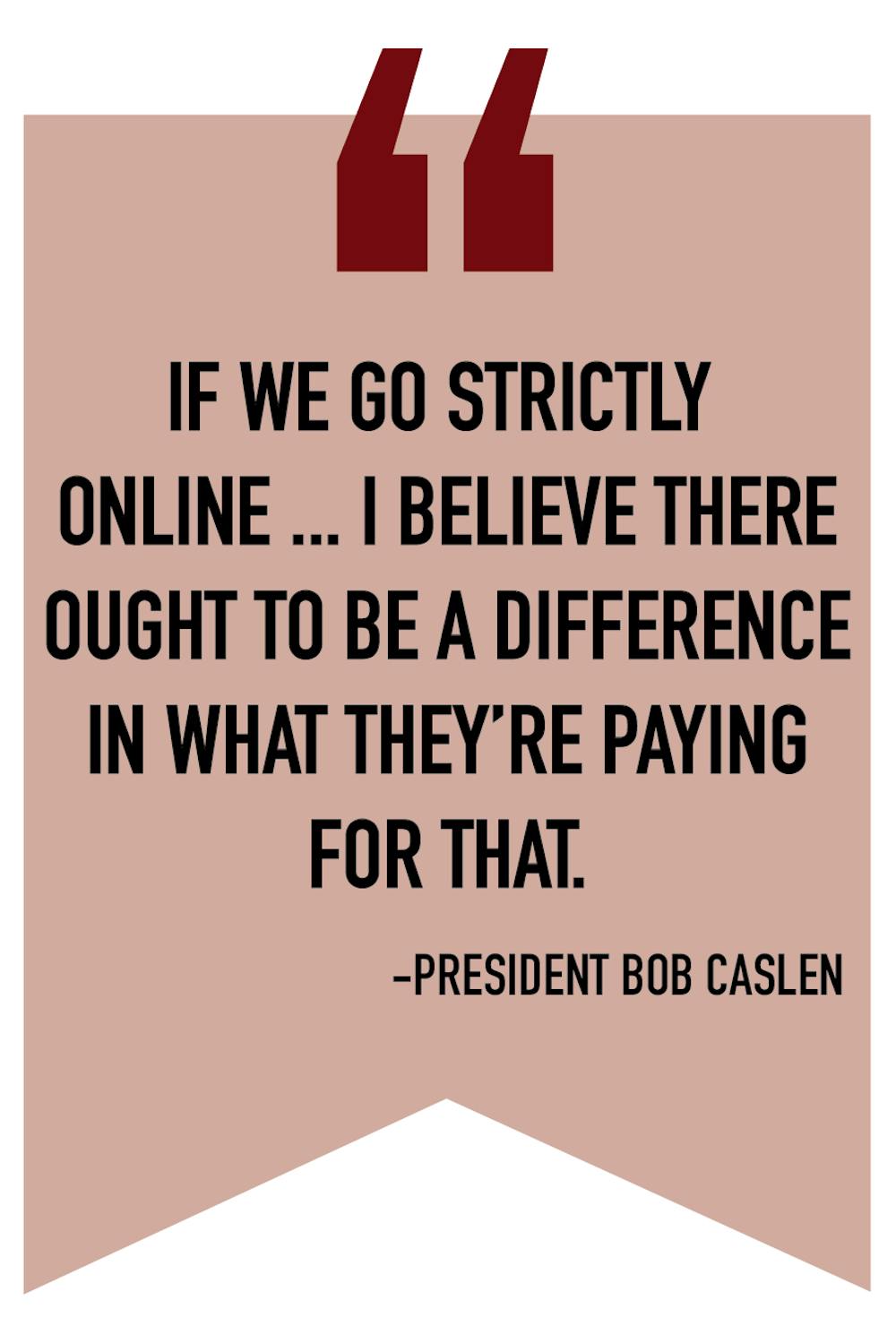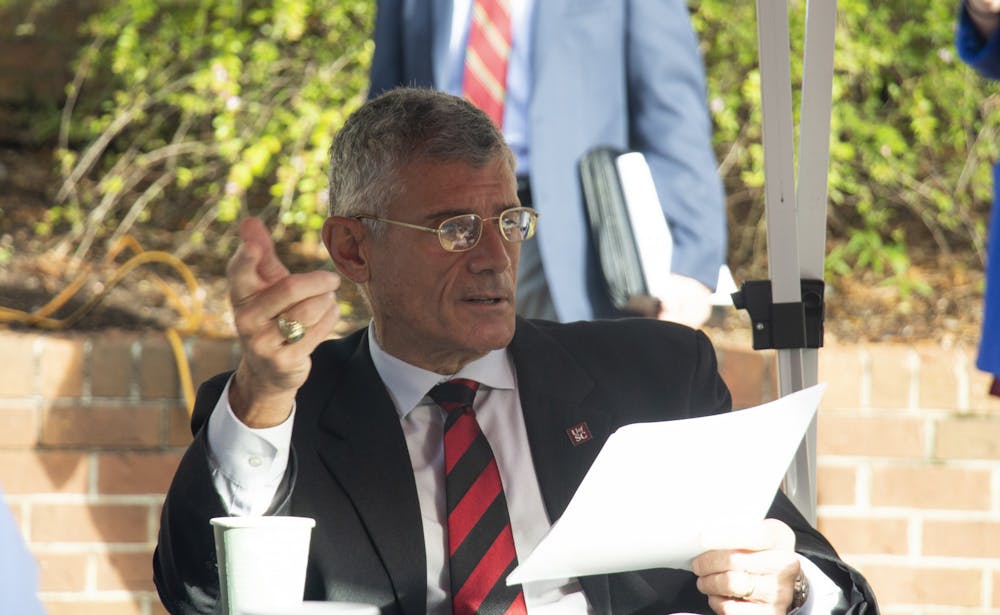President Bob Caslen and the Future Planning Group are exploring different scenarios for the fall semester. Caslen said his priorities are the health of people at USC, the health of people in the wider Columbia community, education and the financial well-being of the university, in that order.
“At this time, all decisions are open, and that's the mission of the planning group is to look at them all, to assess them against those four criteria and other criteria,” Caslen said in an interview with The Daily Gamecock Tuesday morning.
Caslen said he created the Future Planning Group, made up of “senior administrators, informed by faculty and student leaders,” to assess the impact of the COVID-19 pandemic on the university. The group meets with Caslen every Friday and is divided into seven planning committees: academics and research, admissions and enrollment, communications, finance, Gamecock athletics, public health and public safety.
Members on the committees are selected by the committee head. On average, there are a dozen participants in each committee, Jeff Stensland, USC spokesperson, said in a text message.
Mark Bieger, Caslen’s chief of staff, is also leading meetings four days a week to exchange updates with campus leaders. This meeting has upwards of 75 people attending.
“[T]he goal is to ensure everyone has up-to-date information from major areas of operations and any emerging issues can be brought to light,” Stensland said in a text.
At a board of trustees meeting Tuesday afternoon, Caslen said the Future Planning Group will likely make a decision by May 15, but "no later than, for sure, June 15."
“We want to create the timeline but, quite frankly, it’s not our timeline, it’s the virus’ timeline,” Caslen said.

Even after making a decision about fall classes, the university might need to change its course of action if the original decision “produces unacceptable risk.”
“If the world changes after you make a decision — and the world changes — then you've got to be able to have the agility to be able to flex,” Caslen said.
The health and safety of vulnerable populations — older faculty and students with preexisting health conditions — could be at risk if fall classes are conducted on campus, in person.
“The students will vote with their feet, and I'm sure that moms and dads and family members is going to be very influential in that,” Caslen said. “I respect that. If we make a decision and a family acknowledges that they feel that that's unacceptable risk, then they will make a decision themselves.”
For students who want to attend class but cannot because of a health condition, the university plans to be flexible.
“We should be good enough as a university, and our academic units and our deans and our chairs should be good enough as chairs and leaders, to be able to make adjustments that are necessary for the health and welfare and safety of our students,” Caslen said.
This could mean faculty will need to adjust their classes to accommodate for these exceptions, meaning they might have to teach some students in person and others online, perhaps in the same class at the same time.
Faculty who are older than 65 are among the population more vulnerable to COVID-19. It is unclear whether faculty will be required to teach in person or if they will have the option to teach online even if campus is reopened.
“I don't have a good answer, but those are one of the things that our Future Planning Group is looking at,” Caslen said.
According to Caslen, USC’s Columbia campus is expected to receive $21.4 million from the federal CARES Act. He said half the aid, or $10.7 million, will be used to support emergency aid for students, and the rest will go toward institutional support.
The aid will be distributed to the neediest students first, Dennis Pruitt, vice president for student affairs and vice provost, said. Most students will get some kind of small payment, Pruitt said.
“One of the things we'd like to do is, is that if a student gets a little bit of that federal money, they don't need it, is to have them redistribute that money back to our student relief fund, which would be nice for them to do,” Pruitt said.
In addition to the CARES Act, Pruitt is looking to the federal government to help students with financial relief, such as student loan forgiveness, lower loan interest rates and more.
The Future Planning Group is also examining the cost of online classes. Caslen said many students want the "college life experience."
“If we go strictly online, and the student doesn't have that particular experience, you know that there ought to be a difference [in the cost of tuition]," Caslen said. “I believe there ought to be a difference in what they're paying for that.”

There is still much for the university to figure out in terms of COVID-19's financial impact.
“One of the articles that I had read estimated from 10 to 30% of students may not come back,” Caslen said. “So, if we have, let's just say worst case, 30% of students not come back, what does that convert to in finances, in tuition dollars, because that ends up being a loss to the university.”
Caslen didn’t clarify the source of the piece citing that statistic, nor did he say whether it was based on classes being in person or online.
Caslen said it was important to stay connected with students and for deans to build relationships with students.
“It helps to build trust in that because I want the students to trust the leadership of the institution, all the way from their professor through the academic chairs and the deans, and then through the upper level of administration,” Caslen said. “One of those ways is to stay connected; stay connected and be transparent and to communicate.”
Caslen did not specify how the university plans to stay connected with students.
“You know, just check in on them. I think it's important to just check on them and see how they're doing,” Caslen said.
Even if students choose to take a semester off in the fall, Caslen said the university has a "responsibility" to deliver education and stay connected with those students.
“If they do want to take a semester off, I would encourage them, if that's your decision, stay connected with the Gamecocks,” he said. “Let us send you an online course, one course, two courses — whatever you think is feasible, reasonable, be committed to that,” Caslen said.
He said the university is “looking out for [students’] best interest.”
"Sometimes, when you take a semester off, you get diverted. You find a job, you start a career and the next thing you know, you no longer have the time or the energy or interest to go back to a resident program,” Caslen said.

